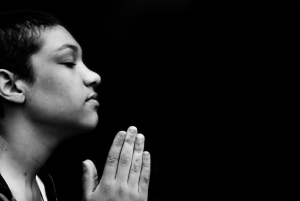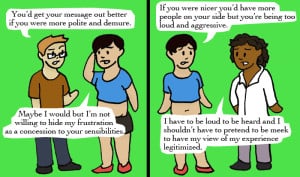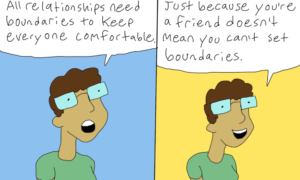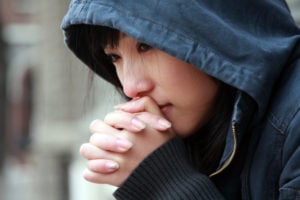Author’s Notes: This article is about my personal experience as a person of faith in mostly atheist radical spaces. This article does not touch upon systematic oppression and violence faced by some religious groups, as I do not experience that as a white pagan. It’s important to note that, although this piece will not discuss these issues, that certain people of faith –including Jewish, Muslim, Native, and other non-white spiritual folks – experience systemic violence through white supremacy and colonialism. These issues are simply separate from what I’m about to recount in this article.
This article isn’t to minimize or negate the oppression people have felt due to the institutional power of religion. It’s valid to not practice faith or participate in religion, and to choose not to due so due to this oppression. This is a personal story of one person of faith and my experiences in mostly atheist radical spaces.
Further, while we’re talking about pagan spirituality, I would like to remind white pagans that there are many traditions that should not be brought into your practice due to cultural appropriation. Steer clear of appropriating native paganism if you are not Native, do not adopt pagan symbols and spiritual symbols that are of non-white origins, and for Tana’s sake, do not refer to yourself as a g-psy (it is a slur used against Romani people). Be aware of what you’re practicing. Spirituality should be something uplifting and empowering, but do not seek empowerment through the disempowerment of others. This also means stepping back when marginalized people of faith are speaking of their experiences that you do not experience as a white person of faith.
As soon as I got to college, I joined the campus Socialist group.
Throughout high school, I had always felt a need to get as involved as possible in what I now know as anti-capitalist politics. And once I found an outlet and source of education for that desire, I became as active as I possibly could.
I was involved in marches, speak outs, conferences, education meetings – anything I could sign myself up for, I was a part of. And everything was going great until one fateful night after a Marxist conference at Harvard.
I was sitting in the middle seat in the second row of a club van en route to Vermont from Boston when two of my “comrades” turned around and began talking to me about my apparent spirituality.
“You can’t be a radical if you are not a devout atheist.”
Now, pretty much everything about that statement confused me.
The first thing that initially struck me was the seeming contradictions in the phrase “devout atheist.” The more important thing that really got to me was the sentiment of that sentence.
I grew up with a mother who self-identifies as a Christian Witch. My childhood was filled with protection spells, veneration of the saints, and what I see as the true teachings of Christ.
My mother had instilled within me from a very young age that the most important thing about being a person of faith was its ability to move you towards compassion, respect, and love.
These were the building blocks for my early activism. My faith is what moved me to become active in my community. Now, I was being told that it was what was keeping me from being a “true” radical.
As my faith developed, so did my activism.
My gravitation towards the more pagan aspects of my family history drove me towards a more radical, explicitly anti-capitalist faith, yet I was still met with teasing, criticism, and ridicule for daring to let my spirituality motivate my politics.
What I kept running into was a particular quote from Marx, used to discredit radicals of faith.
I’m sure anyone who has spent any amount of time with atheist radicals has heard the sentiment “Religion is the opiate of the masses.” Well, I’d like to open you all up to the full quote, and not just the snap shot used to pick at those who dare let their God(s) lead them to revolution:
“Religion is the sigh of the oppressed creature, the heart of a heartless world, and the soul of soulless conditions. It is the opium of the people.”
What in this world is more heartless than the unrestricted violence of global capitalism? What is more oppressive than the violence and demands of white supremacist heteropatriarchy?
So I ask you: Why discredit faith – and the love and community that it brings – in such a heartless world?
Now, I’m aware of what most radical atheist cite as their hatred for religion: that it is rooted in the violence and imperialism of the western Christian church.
And I will never deny the hatred and violence that has come out of the institutional western Christian church. However, where some see it as an indication of the “inherent” harmful nature of religion itself, I see it as a secular distortion of the power a religious community can have that is used as a tool against non-western, non-Christian people of faith.
This atheist critique of the western Christian church denies that the violence it perpetrates is often against revolutionary folks of faith, against indigenous spiritualties, against Jewish folks, Muslim folks – against non-Christian folks of faith.
This violence actually does more for secular imperial capitalism than it has ever done for people of faith.
This understanding of religion also completely glosses over, or outright denies, the role that religion and spirituality has played in revolutions all around the world.
It’s no coincidence that these spiritual revolutions historically grow from communities of color and are overlooked by white-boy manarchists who romanticize the militarized, atheistic revolution of the Bolsheviks.
In my own personal experience, there are a couple of different ways in which people try and discredit my activism because of my spirituality – and vice versa.
Myth #1: Spirituality and Politics Don’t Mix
The first way – the way that I hear the most of (especially from friends) – is that my spirituality makes me a “hippie.”
Now, I don’t know how much time y’all have spent around anarchists punks, but the term “hippie” has a very distinct connotation.
This word is meant to evoke someone who believes we must greet the world with peace, that we must find the good in life – but in a way that essentially ignores the work that must be put in to actually create a better future.
That’s not me. (I mean, okay, I know that many people don’t understand Old Italian Paganism, but my faith can’t be lumped in with apolitical white kids with dreads.)
This issue comes into play because so many radical atheists see spirituality as a cop out. Many folks that I’ve spoken with believe that spiritual beliefs take away from the “rational” mind that is needed to smash the state.
Myth #2: Spirituality Is Inherently Irrational (And We Value the Rational)
This brings me to another issue: the one that says that folks of faith are irrational, deny science, and ignore the facts of life while leaving things to higher beings.
This always strikes me as ironic considering that it’s the capitalist atheist approach to our environment that has led to its destruction.
Many people of faith hold the belief that we’re all connected.
In my own faith, we’re taught that everything on the earth (and beyond it) has an energy, or a spirit, to it – and that we’re a small part of a much larger picture.
This understanding of our environment makes it impossible to see nature as something to be destroyed and exploited. Thus, approaching our environment this way is explicitly anti-capitalist.
This also applies to other spiritual forms of healing that, in their practice, are explicitly anti-capitalist.
In many cultures, including the Italian Old Ways (La Vecchia Religione), things like herbal healing, energy work, and midwifery are both spiritual and medicinal.
In western society, we’ve demonized the use of healing herbs in favor of the Pharmaceutical Industrial Complex, taken midwifery from its practitioners so that hospitals may make thousands of dollars off of birthing techniques that actually do more harm to the pregnant person.
Within this context, reconnecting to these spiritual ways of healing is an act of anti-capitalism as well as an act of spirituality.
Myth #3: Being Spiritual Means You’re Against Science
Another big criticism many radicals of faith get, is that religious people ignore, or go against science. This not only ignores the ways in which science and spirituality can and do overlap, but ignores the fact that western science is inherently colonial, racist, transphobic, and ableist.
It’s also important to remember that when some atheist tries to tell you that your faith makes you opposed to science, ask them why they ignore the scientific evidence that points to tangible benefits in prayer, meditation, and positive thinking.
Ask them why they ignore the scientific evidence that proves to us that there is more to the world than what we can see with our limited eyes, or that there are things that science can’t explain that we know exist anyway.
Ask them why they ignore these facts, that could be helpful and empowering, just because they don’t want to come across as some apolitical “hippie.”
***
Despite these critisms, I have always let my spirituality drive my politics.
It’s the ideas that we’re all connected, that everything has a spirit, that the world is full of energy and mysteries and spirits that drives me to create a world where everyone and everything is treated as such.
There are few things more logical to me than knowing everything is connected, and that therefore, everything must be treated with love and respect.
What distinguishes radicals of faith from those apolitical “hippie” types I mentioned earlier is that radicals of faith are still radicals.
I believe that there is merit in positive thinking and meditation, just as there is merit in confronting your oppressors. I believe that our God(s) will protect us just as much as I know that we must protect ourselves and our communities.
While so many radicals dismiss or openly criticize their comrades of faith, it’s important to remember that many non-white, non-Christian folks of faith are some of the biggest targets of white-supremacist imperialistic violence.
It is vital that we, as radicals, reevaluate the role that spirituality has played and can play in revolutionary actions.
Don’t push your friends of faith to the side. Instead, try to see the radical potential of spirituality.
You can pray for change before the rally and scream for change during it. One does not negate the other, and one is just as important as the other.
[do_widget id=”text-101″]
Kris Nelson is a Contributing Writer for Everyday Feminism. They are a queer trans witch with a BA in Gender, Sexuality, and Women’s Studies. Kris runs a blog full of short queer-centric radical prose, which can be found at thequeertimes.tumblr.com and a poetry blog that can be found at songswithoutlyrics.tumblr.com. Kris also runs an online store by the name of Spell-Bound, where they sell handcrafted wire work jewelry, crystal pendants, hand sewn tarot bags, and pendulums. They can be contacted at [email protected] and trans-witch.tumblr.com.
Search our 3000+ articles!
Read our articles about:
Our online racial justice training
Used by hundreds of universities, non-profits, and businesses.
Click to learn more





















